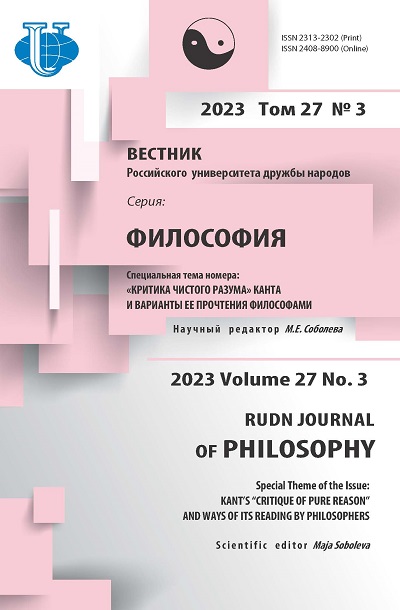Kantian Motives in Work of Ludwig Wittgenstein
- Authors: Sokuler Z.A.1
-
Affiliations:
- Lomonosov Moscow State University
- Issue: Vol 27, No 3 (2023): KANT’S “CRITIQUE OF PURE REASON” AND WAYS OF ITS READING BY PHILOSOPHERS
- Pages: 629-643
- Section: KANT’S “CRITIQUE OF PURE REASON” AND WAYS OF ITS READING BY PHILOSOPHERS
- URL: https://journals.rudn.ru/philosophy/article/view/36052
- DOI: https://doi.org/10.22363/2313-2302-2023-27-3-629-643
- EDN: https://elibrary.ru/ECJVKT
Cite item
Full Text
Abstract
It is proved that the basic framework of the premises and reasoning of Wittgenstein's “Tractatus Logico-philosophicus” corresponds quite well to the transcendental method (as formulated by H. Cohen). Whereas Kant’s philosophy proceeds from the fact of existence of mathematics and mathematised natural science and investigates their conditions of possibility, Wittgenstein proceeds from the fact that propositions of language describe reality and reveals the conditions of possibility of such descriptions. Kant, answering the question about the conditions of possibility of the named sciences, comes to the idea of the transcendental subject and the distinction between the world of phenomena and the thing in itself. Wittgenstein's investigation of the conditions of possibility that the world is described by propositions leads to the assertion that both the world and language are together in logical space. The latter constitutes the a priori and transcendental condition of the possibility that language “reaches out” to reality. For both the theories - in the “Critique of Pure Reason” and in the “Tractatus Logico-Philosophicus” - the idea of the boundary is important. In the “Critique of Pure Reason” it is the boundary of possible experience and cognition, while in the “Tractatus Logico-Philosophicus” it is the boundary of what can be thought and expressed by meaningful propositions. Related to the different definitions of the boundary is the difference in the treatment of mathematised natural science. For “The Critique of Pure Reason” was created in the era of unconditional acceptance of Newtonian mechanics. And the “Tractatus Logico-Philosophicus” was created at the time of the crisis of the Newtonian paradigm and its replacement by other notions of time and space. However, the idea of boundary, which is present in both doctrines, determines closeness in the attitude towards metaphysics between the author of “The Critique of Pure Reason” and the author of “The Tractatus Logico-Philosophicus”. The study also shows that Wittgenstein did not follow logicism in his philosophy of mathematics. For him, both mathematical objects and propositions of logic are constructions. The conviction about the constructive character of mathematical and logical objects shows an affinity with the Kantian tradition in the philosophy of mathematics.
About the authors
Zinaida A. Sokuler
Lomonosov Moscow State University
Author for correspondence.
Email: zasokuler@mail.ru
ORCID iD: 0000-0002-0602-4295
PhD in Philosophy, Professor, Chair of Department of Ontology and Theory of Knowledge
27-4 Lomonosovsky Prospekt, GSP-1, Moscow, 119991, Russian FederationReferences
- Kozlova MS. Specifics of Philosophical Problems: Position of L. Wittgenstein. In: Philosophical Ideas of Ludwig Wittgenstein. Moscow: Institute of Philosophy publ.; 1966. P. 132—134. (In Russian).
- Medvedev NV. Is Wittgenstein a follower of Kant? (Reflections on the proximity of the philosophical projects of the early L. Wittgenstein and I. Kant). Humanities. Bulletin of TSU. 1997;(1):22—32. (In Russian).
- Hanna R. Wittgenstein and Kantianism. A Companion to Wittgenstein. Glock H-J, Hyman J, editors. London: John Willey & Sons, Ltd; 2017. P. 682—698.
- Glock H-J. Kant and Wittgenstein: Philosophy, Necessity and Representation. International Journal of the Philosophical Studies. 1997;(5):285—305.
- Appelqvist H. On Wittgenstein's Kantian Solution of the Problem of Philosophy. Available from: http://www.tandfonline.com/doi/abs/10.1080/09608788.2016.1154812 (accessed: 09.03.2023).
- Livingston PM. Philosophy and the Vision of Language. London, N.Y.: Rutledge; 2008.
- Kant I. Criticism of Pure Reason. Moscow: Nauka publ.; 1998. (In Russian).
- Wittgenstein L. Tractatus Logico-Philosophicus. Moscow: Kanon+ publ.; 2008. (In Russian).
- Kant I. Prolegomena to any future metaphysics that can appear as a science. In: Works in 6 vols. Vol. 4. Pt. 1. Moscow: Mysl publ., 1965. P. 67—210. (In Russian).
- Poincare A. About science. Moscow: Nauka publ.;1983. (In Russian).
- Sokuler ZA. Logic in Ludwig Wittgenstein’s “Tractatus Logico-Philosophicus”. Bulletin of Moscow University. Ser. 7. Philosophy. 2022;(3):19—35. (In Russian).
- Kant I. On the first basis of the difference of sides in space. In: Works in 6 vols. Vol. 2. Moscow: Mysl publ.; 1964. P. 371—379. (In Russian).
- Wittgenstein L. Notebooks 1914—1916. 2nd ed. Oxford: Basil Blackwell; 1979.
- Frascolla P. Wittgenstein’s philosophy of mathematics. London, NewYork: Routledge; 1994.
- Wittgenstein L. Philosophische Grammatik. Frankfurt on the Main; 1973.
- Wittgenstein L. Culture and values. In: Philosophical works. Pt. I. Moscow: Gnosis publ.; 1994. P. 407—492. (In Russian).
















